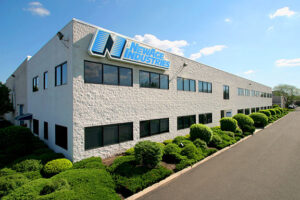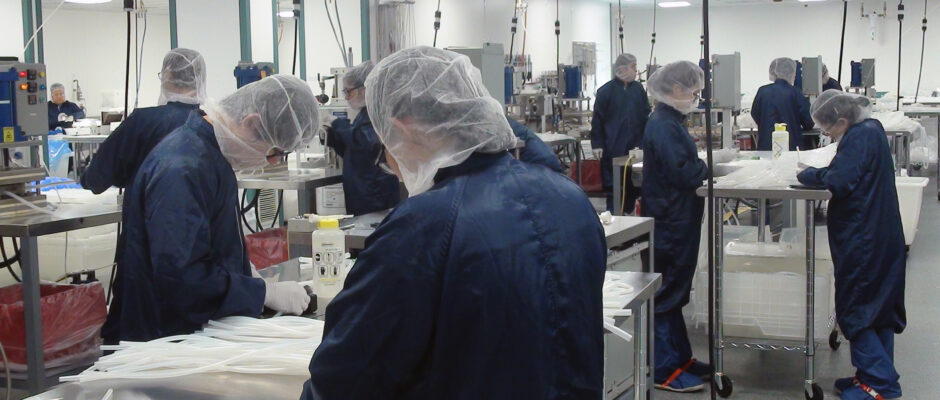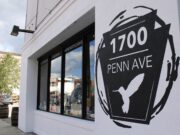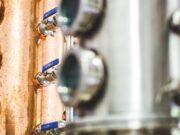In 2021, all eyes are on COVID vaccine development, production, and distribution, and it’s not only the scientists, doctors, and biotech professionals working overtime. Operation Warp Speed also targets companies like Southampton, PA’s NewAge Industries, which manufactures the stuff vaccine-makers need.
NewAge and the brands under its umbrella produce and assemble plastic and rubber tubing for a wide variety of industries, from healthcare to home brewing. Designated an essential business by Governor Wolf at the start of the pandemic, they had to ramp up production while other businesses were closing down, especially as Operation Warp Speed required them to prioritize critical vaccine equipment.
“What Operation Warp Speed is all about is the government can dictate to an organization like ours to prioritize what orders get done first,” says NewAge CEO Ken Baker. “Every third day, we get an Operation Warp Speed order that’s got to go to the top.”

“It runs havoc with your production schedule,” he admits. “I’ve never been in a business situation where you have this third party that has so much say in your organization,” but “it’s good for the nation and the world, because it’s all about making the vaccine for COVID-19.”
NewAge is now running “24/6” (six days a week instead of five) to meet the demand.
The company’s products are essential because vaccines are created in single-use systems: a plastic bag or bottle with tubing, connectors, and filters that combine the ingredients for vaccine batches. Once a batch is done, new equipment is needed for another.
“We make those plumbing systems,” explains Baker. “Without those systems, pharmaceutical or biotech companies cannot make their vaccine.”
“We’re really proud of the team who’s stepped up,” adds NewAge CFO Jim Horan of the manufacturer’s 233 employees. They are “fighting the fight with us, dealing with their own concerns about the virus.”
While other businesses were laying people off and downsizing, we can’t hire fast enough.Jim Horan
NewAge is also notable for its financial structure. The employees are its shareholders: The company gave its workers ownership interest with an Employee Stock Ownership Plan (ESOP)—the only ESOP manufacturing company in their sector, says Baker, though manufacturing in general has the country’s largest segment of ESOPs.
The company started out under Baker’s father in the 1950s as an importer and distributor of tubing and metal hardness testing equipment. The tubing side of the business grew in the following decades as plastic took over for glass and metal in many industries. Baker has run the tubing side of the business since 1985, with his brother handling the company’s other wing.
By 1998, Baker had bought out his dad and his brother. Once he held 100 percent of the company and had cleared his debt from the buyout, it was time to start implementing a model he first learned about at an industry conference in Chicago in 1995.

“I wanted a high-performance company,” he says. “If you don’t give ownership, you’re really not getting that high performance, because I think that an employee is different than an employee-owner.”
ESOPs also helps preserve jobs — the structure keeps a company safe from the whims of buyouts and private equity — and are tax-efficient.
In 2006, he sold 30 percent of the company to the employees, and four years later, another 10 percent. He retained control through 2016 with 51 percent ownership, after selling another nine percent. The process was complete in 2019, when he sold the remaining 51 percent. NewAge was now 100 percent employee-owned.
“I’m a big advocate of this model,” says Baker, but “the problem is that almost no-one knows about it.” Business brokers, private equity, and multinationals buy and sell companies, “and they never mention ESOP as an alternative for a guy like me to exit out of a company, or do a succession plan.”
If you don’t give ownership, you’re really not getting that high performance, because I think that an employee is different than an employee-owner.Ken Baker
Employees benefit, too. Baker notes that several NewAge workers have retirement accounts topping $1 million, “and some of them are on the factory floor.”
To spread the word, Baker launched a nonprofit, the Pennsylvania Center for Employee Ownership, with its own full-time executive director, offering seminars to business owners and finance professionals, and advertising online to boost awareness in the business community.
NewAge is also proud to have become a Certified B Corporation in 2020, an international designation awarded to companies that make green initiatives, employee welfare, and social good as important as their profits. The company’s current Southampton headquarters boasts more than 4,000 solar panels on its roof, generates no landfill trash, maximizes recycling of materials, and is outfitted with LED lights.
NewAge is currently expanding, with a planned 97,000-square-foot office and manufacturing space opening in nearby Warrington. And they’re hiring: office, manufacturing, engineering, IT, and warehouse workers are all needed.
“This organization he has built is an economic development engine,” says CFO Horan of Baker. “While other businesses were laying people off and downsizing, we can’t hire fast enough.”
ALAINA JOHNS is a Philadelphia-based freelance writer and the Editor-in-Chief of BroadStreetReview.com, Philly’s hub for arts, culture and commentary.



